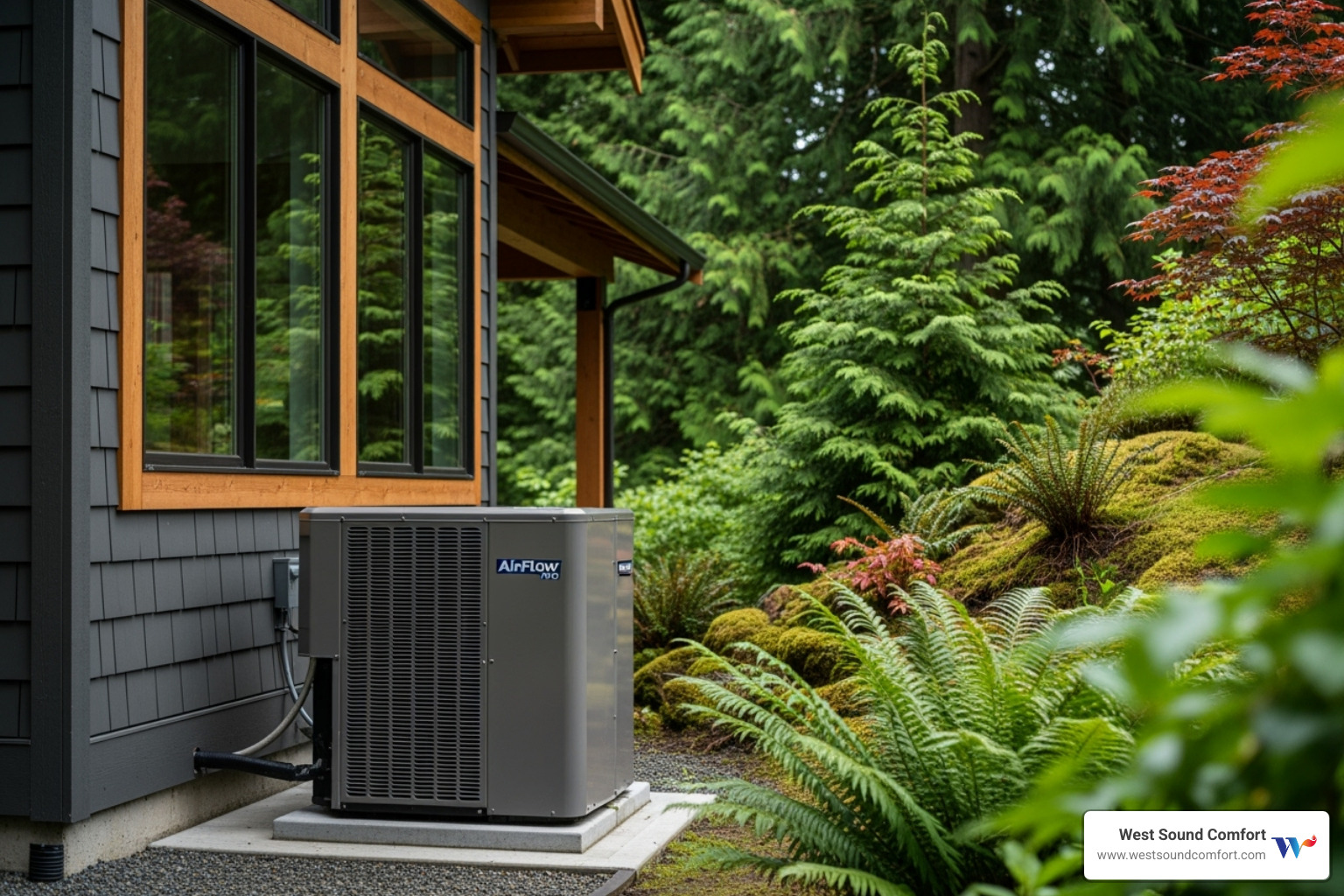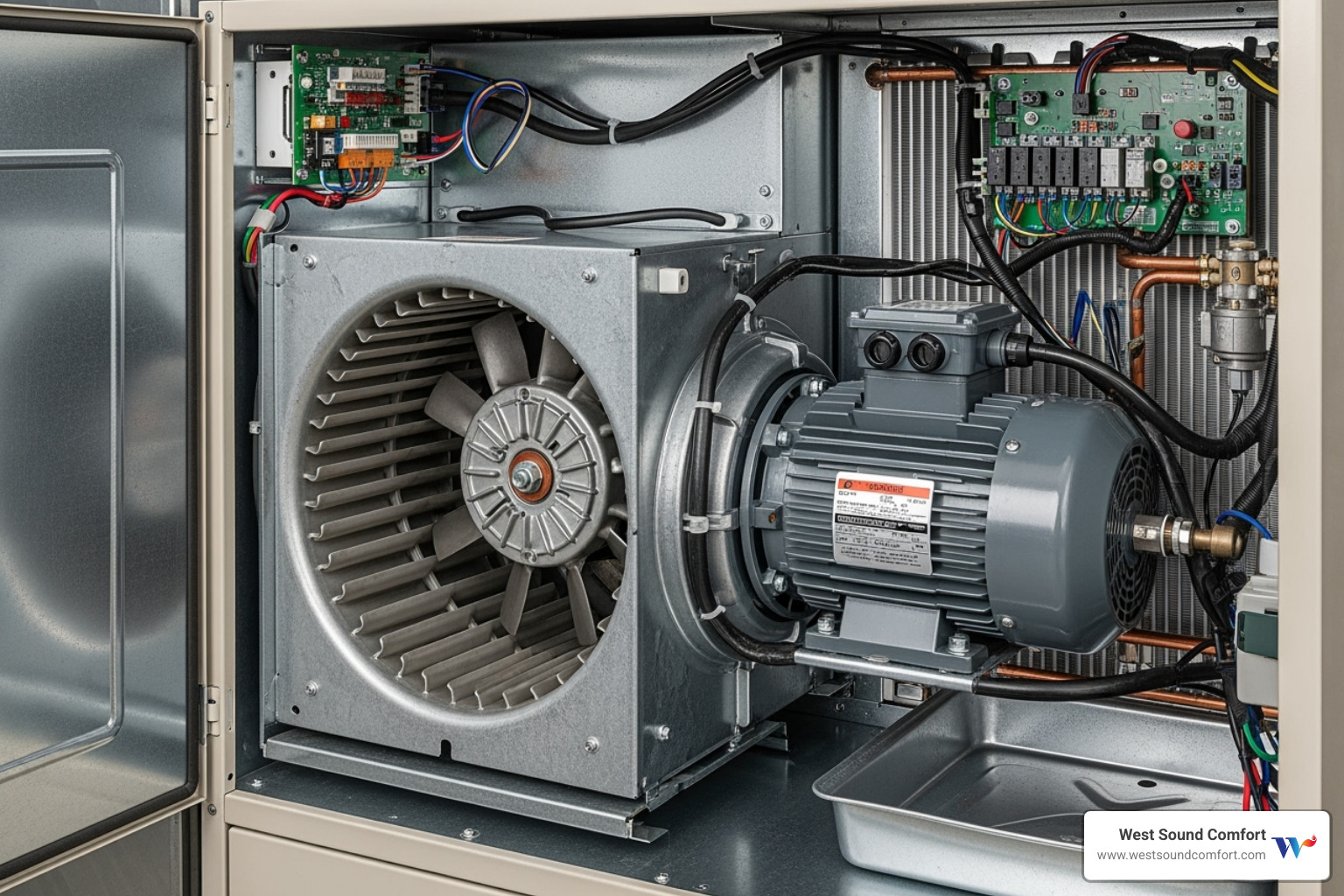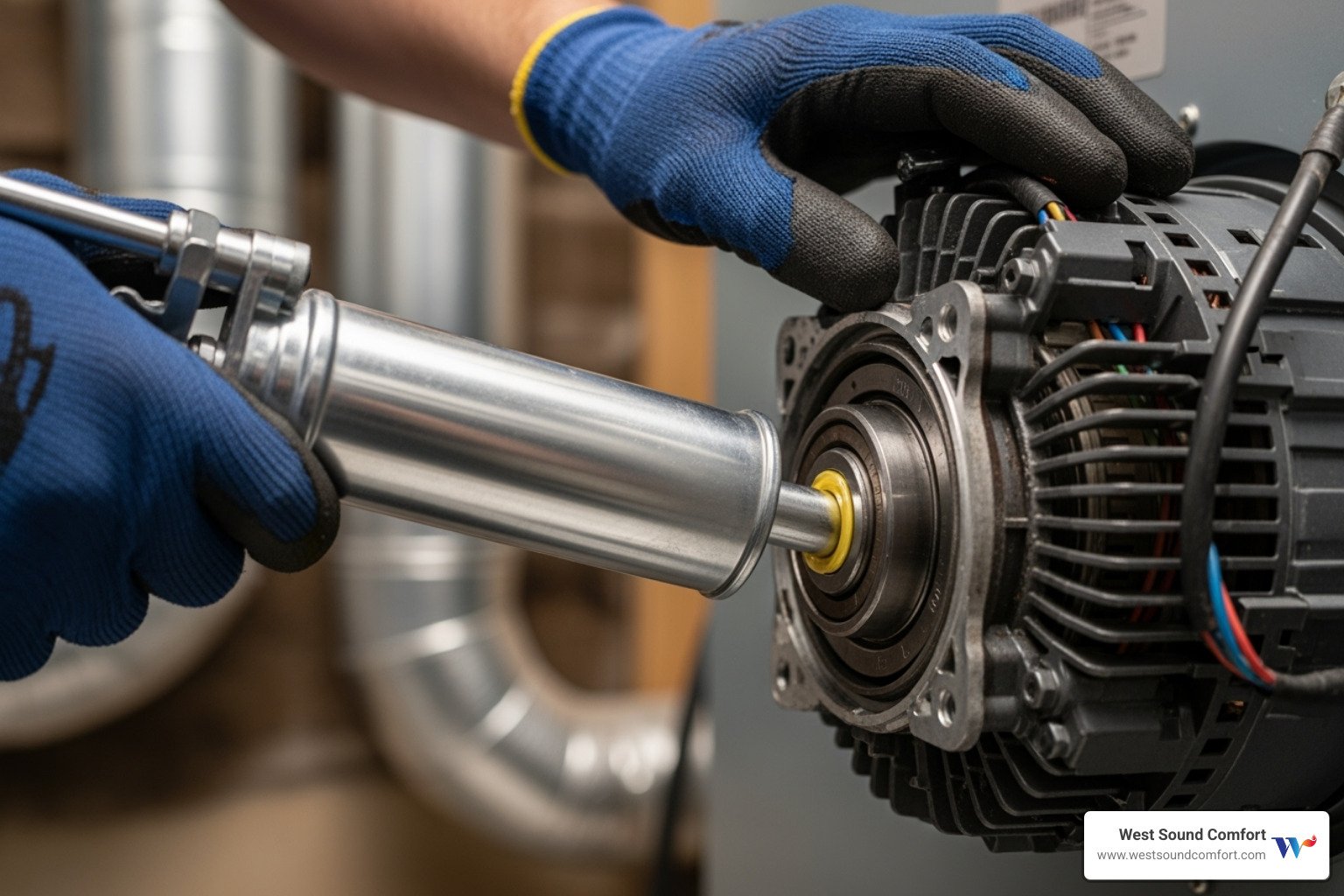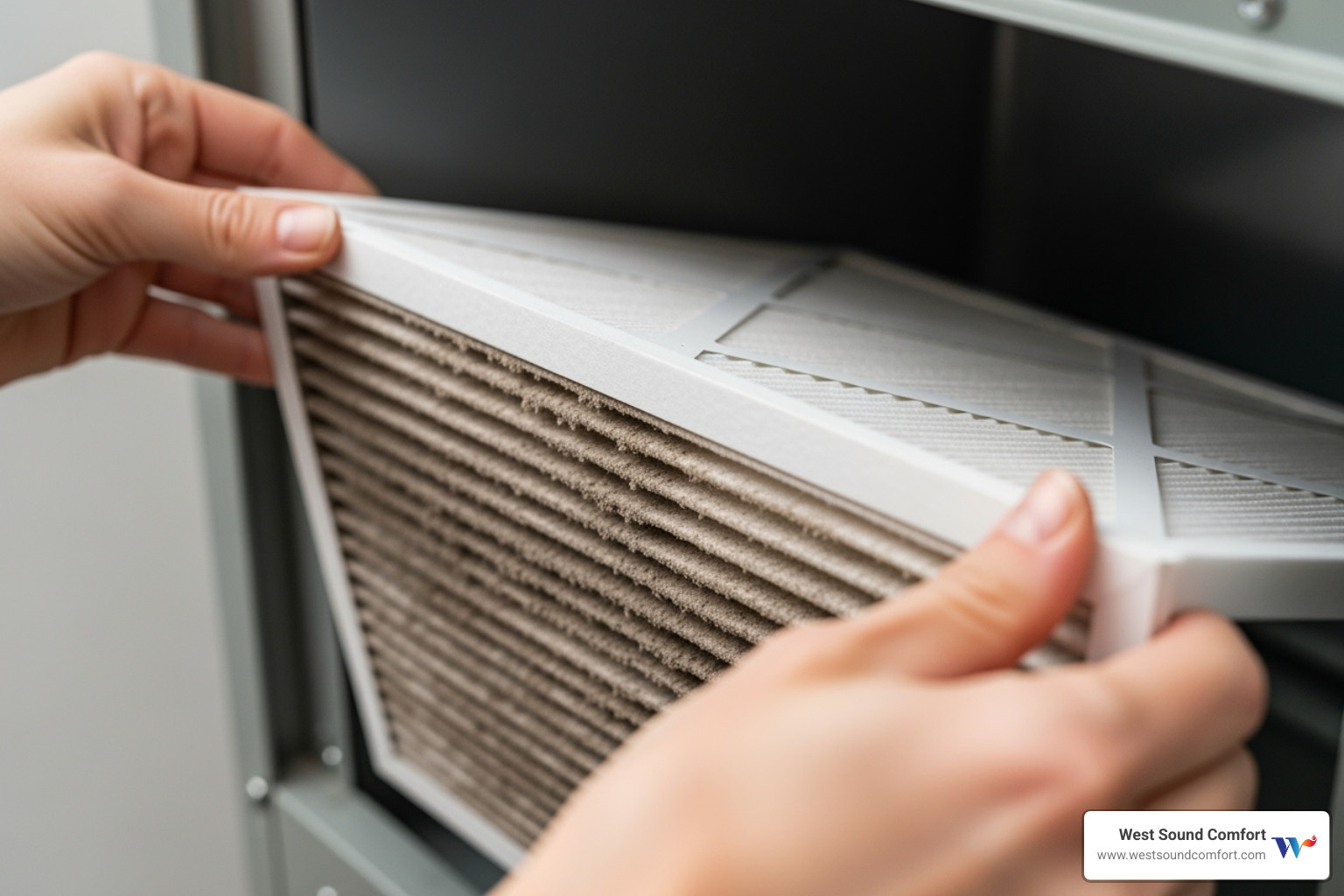Grinding, Whining, or Banging? What Your Poulsbo HVAC is Trying to Tell You
Your HVAC System is Talking – Are You Listening?

If your hvac making noise in poulsbo, wa has you worried, you're not alone. Strange sounds from your heating or cooling system are often the first sign that something needs attention. Here's what those noises typically mean:
Common HVAC Noises and What They Indicate:
- Banging or clanking – Loose parts, unbalanced blower, or broken component
- Whistling or hissing – Air leaks, ductwork problems, or refrigerant leak
- Buzzing or humming – Electrical issues, failing capacitor, or motor problems
- Grinding or squealing – Worn bearings, failing belt, or lack of lubrication
- Clicking – Normal startup/shutdown, or possibly a failing thermostat
Your HVAC system works hard to keep your Poulsbo home comfortable. When it starts making unusual sounds, it's a warning sign that something is wrong. Ignoring these noises can lead to costly repairs, higher energy bills, and even complete system failure. The good news is that many noises have simple explanations, and catching problems early can save you money and headaches.
For comprehensive heating and cooling solutions, check out our HVAC services, or if you need immediate help, book an appointment now.
A Decoder for Common HVAC Noises
When your HVAC system runs smoothly, it produces little more than a gentle hum. But when something goes wrong, that peaceful sound can turn into a jarring symphony of clanks, squeals, and buzzes. Each unusual sound is your system's way of telling you what's wrong. Understanding these sounds is the first step to getting your system back to its quiet, efficient self. Let's decode the most common noises that mean your hvac making noise in poulsbo, wa needs attention. For a comprehensive breakdown, our guide on 10 Noises That Mean You Need AC Repair goes into even more detail.
Banging or Clanking
A banging or clanking sound means something inside your HVAC unit is loose, broken, or out of balance. Don't ignore this sound—loose parts can quickly become broken parts.
- Loose parts: Screws, bolts, or access panels can rattle inside the unit. System vibration can loosen these components over time, especially without regular maintenance.
- Unbalanced blower fan: Dirt buildup or damage can cause the fan to wobble and bang against its housing, causing further damage.
- Compressor issues: Loud banging from the outdoor unit, especially on startup, could mean the compressor is loose or failing.
- Ductwork: Sometimes, the noise is just your metal ductwork expanding and contracting with temperature changes, which can create surprisingly loud booming sounds.

Whistling or Hissing
Whistling or hissing noises mean air or refrigerant is escaping through a small opening under pressure.
- Air leaks in ductwork: This is the most common cause. Small gaps or disconnected joints can create a loud whistle as conditioned air escapes, wasting energy.
- Clogged air filter: A dirty filter restricts airflow, forcing air through any available gap and creating a whistling sound while straining your system. Change your filter regularly.
- Blocked vents: Closing vents in unused rooms can increase air pressure in your ducts, causing whistling and creating pressure imbalances.
- Refrigerant leak: A high-pitched hiss from your outdoor unit could signal a serious refrigerant leak. Refrigerant is hazardous, and your system can't cool without it. If you suspect a leak, shut down your system and call a professional immediately.
Buzzing or Humming
While some humming is normal, a loud or sudden buzz indicates a problem.
- Electrical issues: Buzzing often points to electrical problems like a failing capacitor, loose wiring, or a faulty contactor. These are potential fire hazards that require immediate attention.
- Malfunctioning motor: A motor with worn bearings can hum or buzz, especially if it's struggling to start. A loud hum without the motor running means it's drawing power but not working.
- Loose components: Sometimes the buzzing is just loose parts vibrating against the unit's cabinet. The fix might be as simple as tightening a few screws.
- Compressor issues: A loud, prolonged buzz from the compressor suggests it's struggling to start or has internal damage. For more insights, check out our article Why Is My HVAC So Loud?
Grinding or Squealing
These are serious sounds that mean metal is rubbing against metal due to worn-out parts or other mechanical problems.
- Worn motor bearings: These cause a grinding sound that worsens over time as the motor's shaft loses its smooth rotation.
- Failing belt: A high-pitched squeal usually comes from a worn, loose, or misaligned belt. Replacing a belt is inexpensive, but ignoring it can lead to a much costlier motor replacement.
- Lack of lubrication: In older systems, unlubricated moving parts can cause grinding. While many modern units have sealed bearings, older ones may require periodic oiling.
- Damaged fan blade: A broken or bent fan blade can scrape against the unit's housing, creating a grinding or scraping noise.
- Compressor damage: In severe cases, grinding can indicate catastrophic internal compressor damage—one of the most expensive HVAC repairs.

Clicking
Clicking can be tricky; sometimes it's normal, but other times it's a warning sign. The key is to recognize when it becomes excessive or unusual.
- Normal operation: A few clicks during startup and shutdown are normal. This is just the sound of electrical relays controlling your system.
- Failing thermostat: Frequent clicking without the system starting could indicate a failing thermostat or another issue preventing it from running.
- Electrical control issues: Persistent clicking during operation can signal a problem like a compressor repeatedly failing to start or a chattering relay.
- Short-cycling: If your system clicks on and off frequently without completing a full cycle, it's a serious problem. This could be caused by an oversized unit, a clogged air filter, or low refrigerant. Short-cycling wastes energy and increases wear and tear.
The bottom line: A few clicks at startup are fine. Constant clicking, clicking without the system starting, or rapid on-off cycling means it's time to call in the professionals.
The Risks of Ignoring an HVAC Making Noise in Poulsbo, WA
Just like a strange sound from your car, an unusual noise from your hvac making noise in poulsbo, wa is a warning that needs attention. Ignoring it rarely ends well. What starts as a minor buzz can quickly snowball into a major breakdown. Running a system that's grinding or banging isn't just annoying—it's actively damaging other components, setting you up for more expensive repairs and potential system failure when you need it most.
For more information on how we can help keep your system running smoothly, explore our HVAC services.
Higher Energy Bills and Inefficiency
When your system makes unusual sounds, it's not working efficiently. A worn bearing or slipping belt forces your system to work harder, which shows up on your monthly energy bill. According to ENERGY STAR®, heating and cooling account for roughly half of a household's energy costs. If your system is struggling, you're wasting money.
Ignoring these noises means you're actively wasting energy every day. Regular maintenance can improve efficiency by up to 30%. A simple noise that goes unchecked can escalate into a major expense, like a burnt-out motor, turning a simple repair into a costly replacement.
How Poulsbo's Climate Impacts an HVAC Making Noise in Poulsbo, WA
Poulsbo's unique Pacific Northwest climate, with its constant moisture and temperature swings, puts extra stress on HVAC systems.
Our damp conditions are tough on outdoor units, causing moisture buildup that leads to rust and corrosion on metal parts. This corrosion creates friction and noise, like squealing or grinding, as our wet weather wears down your system.
Winter increases the workload on your heating system, making underlying problems more obvious. A minor issue in the fall can become a loud banging noise in January when the system runs constantly. Dampness can also promote mold growth in your ductwork, restricting airflow and creating whistling sounds while harming your indoor air quality. If you're preparing your system for winter, our 5-Step Checklist for Another Pacific Northwest Winter can help you get ahead of these problems.
Safety Concerns and Catastrophic Failure
Some HVAC noises are more than inconvenient—they're dangerous. Ignoring them can put your home and family at risk.
- Electrical fires: Buzzing or clicking, especially with a burning smell, can signal electrical issues that are potential fire hazards. An ignored buzz could lead to a house fire.
- Refrigerant leaks: A hissing sound could be a refrigerant leak. This is serious, as refrigerant is hazardous and a leak strains your compressor, shortening its lifespan.
- Carbon monoxide: With a furnace, banging could indicate a cracked heat exchanger, which can leak deadly, odorless carbon monoxide into your home. This is a life-threatening emergency that requires immediate professional attention.
- Compressor burnout: Grinding noises often mean the compressor is failing. Ignoring this can lead to a compressor burnout, one of the most expensive HVAC repairs, often requiring a full system replacement.
Ignoring noises creates a domino effect: one failing part stresses others, leading to catastrophic system failure. Our guide on 4 Signs Your AC Might Not Survive the Summer can help you spot these warning signs before it's too late.
Simple DIY Troubleshooting vs. Calling a Professional
When your hvac making noise in poulsbo, wa, some sounds have simple causes you can check yourself. Even if you can't fix the problem, doing a little detective work can help our technicians diagnose the issue faster. However, it's crucial to know when to step back and let the experts handle it. Complex repairs require specialized tools and training. Attempting them yourself can worsen the problem, void your warranty, or even be unsafe.

Quick Fixes You Can Try First
Before calling, perform these simple checks. Safety first! Always turn off your HVAC system at both the thermostat and the circuit breaker before inspecting any components.
- Check your air filter. A clogged filter is a common cause of whistling and whooshing sounds. If you can't see light through it, it's time for a replacement. This five-minute task solves a surprising number of noise issues.
- Inspect your air vents. Walk through your home and make sure all vents and registers are open and not blocked by furniture or other items. Blocked vents create pressure imbalances that lead to noise.
- Look at your outdoor unit. Clear away any visible debris like leaves or twigs that could be caught in the fan. While you're there, check that the exterior panels are secure, as a loose panel can vibrate and rattle.
- Reset the system. For mysterious clicking or humming, try resetting your system at the circuit breaker. Turn it off, wait a few minutes, then turn it back on to clear minor electrical glitches.
These steps won't fix everything, but they might save you a service call.
When to Call a Professional for an HVAC Making Noise in Poulsbo, WA
Some noises are clear signals that it's time to call in the experts. Your HVAC system is complex, and trying to fix certain problems yourself can be dangerous.
- Grinding or squealing sounds almost always mean worn motor bearings or a failing belt. These require professional diagnosis and replacement parts.
- Any burning smell combined with noise is an emergency. Turn off your system immediately and call us, as this indicates a fire hazard.
- Hissing or bubbling sounds suggest a refrigerant leak. Handling refrigerant requires EPA certification and specialized tools. A leak can also damage your compressor if left unchecked.
- Persistent electrical buzzing might indicate a failing capacitor or other serious electrical fault. These are fire hazards that need professional evaluation.
When in doubt, reach out. If a noise makes you uncomfortable or persists after your troubleshooting, it's time to call us. We'd much rather catch a small problem early. You can easily Book Now with our team, and we'll get your system back to running quietly and efficiently.
Proactive Care: The Key to a Quiet, Efficient System
The best way to avoid dealing with your hvac making noise in poulsbo, wa is to stop problems before they start. Like getting an oil change for your car, regular HVAC maintenance is the secret to a system that hums along quietly, keeping you comfortable without demanding attention.
At West Sound Comfort, we've seen countless times how a simple tune-up could have prevented an expensive emergency repair. With over 30 years in this business, we know that the happiest homeowners are the ones who schedule regular check-ups. We want to keep you in "The Comfort Zone"—that sweet spot where your home is comfortable, your system is reliable, and you're not wondering what that strange banging sound means. For more helpful tips, visit The Comfort Zone.
The Value of Regular HVAC Inspections
During a routine inspection, our technicians are trained to spot the tiny warning signs most people miss—a fraying belt, an unbalanced fan blade, or a wearing motor bearing. These are the issues that, left unchecked, turn into grinding, squealing, and banging noises.
Our team methodically works through your system, tightening loose components, clearing debris, and ensuring proper lubrication and secure electrical connections. We even stock common parts in our vehicles, so we can often perform repairs on the spot. This proactive care leads to:
- Early problem detection to avoid surprise breakdowns.
- Improved efficiency by up to 30%, saving you money.
- Peace of mind knowing your system is professionally checked.
- Extended system lifespan, protecting your investment.
How a Maintained System Improves Home Comfort
A well-maintained system does more than just run quietly. Customers often tell us they didn't realize how much better their home could feel until after a maintenance visit.
- Consistent temperatures: No more hot or cold spots. A clean system distributes air evenly, just as it was designed to.
- Better air quality: Clean filters and ductwork mean better circulation and fewer allergens, which is a huge benefit for families with allergies or asthma.
- Quieter operation: A properly maintained HVAC system should be something you barely notice. It keeps you comfortable without announcing its presence with loud noises.
Living in the Pacific Northwest means our heating systems work hard. Proactive maintenance helps your system handle that workload efficiently. For more advice, see our guide on 5 Energy Saving Moves for the First Cold Snap in the Pacific Northwest.
Restore Peace and Quiet to Your Poulsbo Home
Your home should be a sanctuary, not a source of stress from strange HVAC noises. When your hvac making noise in poulsbo, wa, it's not just disrupting your peace; it's a sign that your system's health is at risk.
We've decoded the most common HVAC noises: banging (loose parts), whistling (air/refrigerant leaks), buzzing (electrical issues), grinding (worn parts), and persistent clicking (control problems). Ignoring these signs leads to higher energy bills, inefficiency, safety hazards like electrical fires or carbon monoxide leaks, and eventually complete system failure. In Poulsbo's damp climate, these problems can escalate even faster.
We've been serving Kitsap, Pierce, Mason, Clallam, and Jefferson Counties for over 30 years. We know that addressing noise issues early saves homeowners thousands. Our technicians service all brands, and we back our work with a 5-year warranty on parts and labor. Our 95% customer retention rate reflects the trust our neighbors place in us.
While you can do simple fixes like changing filters, most HVAC noises require professional expertise. Don't risk your safety or a costlier repair. For any persistent grinding, buzzing, or hissing, our team is ready to diagnose and resolve the issue quickly.
Your HVAC system is trying to tell you something. It's time to listen. Get expert HVAC help in the Poulsbo Area with West Sound Comfort today, and let us restore the peace and quiet your home deserves. For more information on our services, visit our HVAC services page.
